Total Cost of Ownership..Built Into the Belt
The value of a belt isn’t solely found in the price you pay. It’s in the performance, durability, and useful life of the belt. Cambelt engineers their belts to outlast the competition through superior design. Where competition belts can cost less, they often delaminate, come apart and fail significantly faster than the superior monolithic designs of Cambelt. Considering the devastating costs related to downtime, belt failure, and maintenance, the ultimate value of Cambelt shines through in the Total Cost of Ownership. Superior design and engineering means longer lasting performance, stretching cost over much longer time periods. Every belt is made in Salt Lake City, Utah…not subject to costly oversees shipping, foreign build penalties or lengthy build time delays. Invest in a Cambelt. Invest in superior performance.
Cambelt
Move More, Downtime Less
Cambelt utilizes a novel manufacturing process of directional molding to create one-piece, high profile conveyor belting. The sidewalls, cleats or nubs, and base belt are formed in one cure, utilizing the maximum number of bond sites possible, bypassing the need for a post-vulcanizing process that creates weak points in our competitors belting. The resulting product excels in harsh-condition applications such as high heat, high abrasion, chemical attack; or give extended belt life in typical conveying conditions. Our sidewalls and cleats cannot delaminate from the base belt due to the belting being manufactured in this one cure, one-piece method.
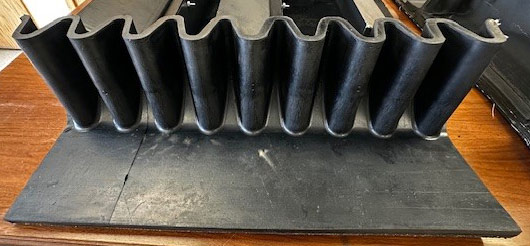
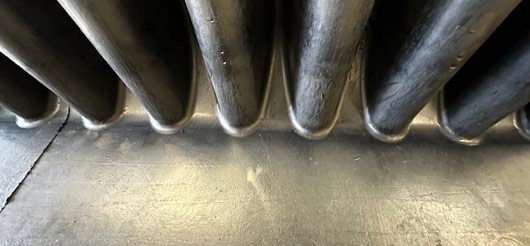
The Competition
Where others slip. We Climb
The traditional method for manufacturing high profile conveyor belting is to assemble cured base belt and cured sidewall and cleats in a post-vulcanizing process referred to as cold bonding or hot bonding. This method of bonding already-cured belt components together creates weak points or susceptible areas for cracking and delamination. When rubber is cured, a certain percentage of potential bond sites, or monomers, are utilized to form polymer chains. These polymer chains give the rubber its physical properties. Rubber can be cured multiple times, but with each cure, the number of potential bond sites significantly reduces, resulting in reduced physical properties.
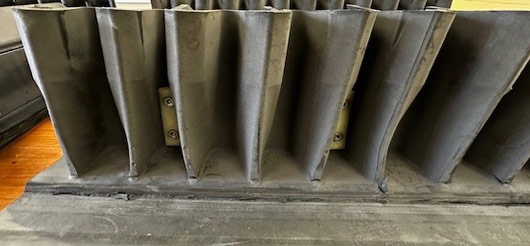
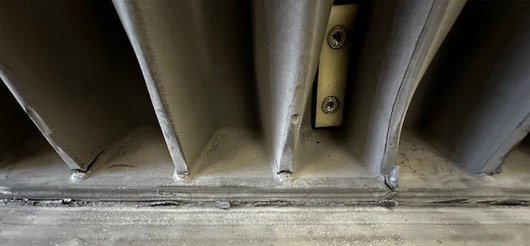
We do not rely on gluing or vulcanizing, as our base belt, sidewall, and cleat or nubs are produced as a single homogenous belt. This design ensures that our products are rugged and will not delaminate, providing our customers with peace of mind. Our range of sidewall belt conveyor designs are suitable for any incline and material, making Cambelt the perfect choice for your material handling needs.
- General Purpose (Black)
- Oil & Fat Resistant (Black)
- Heat Resistant (Black)
- Cold Resistant (Black)
- Flame Retardant (Black)
- Conductive (Black)
- MSHA Approved (Black)
- Food Grade Natural Rubber (White)
- Food Grade Oil & Fat Resistant (White)
Camflex

CamFlex belts feature nubs or finger-style protrusions and can convey material at inclines of up to 65-70°. The nubs and sidewalls are molded together with the base carcass to form a strong, homogeneous belt that provides exceptional adhesion strength.
Camwall

CamWall belts are corrugated sidewall conveyor belts that can include cleats or buckets, designed for conveyors with inclines of up to 90°. These belts are monolithically molded with the base carcass, creating exceptional adhesion strength.
Cambelt
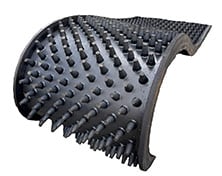
Cambelt’s Original high incline belt is where we got our name – Cambelt. Our Cambelt line of conveyor belts are the smallest belts we make, with a 1” banner sidewall with a nubbed or finger interior.
Custom Engineered Belts
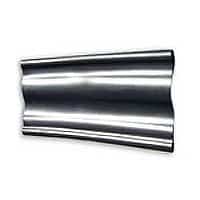
Cambelt operates its own rubber molding presses, capable of manufacturing a variety of rubber molding products. We can provide custom rubber belting as wide as 5′ and as long as 18′ per heat.
Cambelt has been a trusted manufacturer of dry bulk material handling equipment for many decades. We take pride in our expertise in designing sidewall belt conveyors that meet the challenges of a wide range of applications. Our corrugated sidewall conveyor belts are manufactured in the USA using our unique and patented one-piece sidewall conveyor belt technology, which ensures exceptional durability and longevity.
Choosing the Correct Belt for Your Conveyor
Like most industrial or commercial equipment, corrugated belts come in various designs to suit the needs of various industries. When determining which corrugated conveyor systems to buy, a considerable amount of the purchasing process should be spent focusing on the needs of your specific operations. Considerations include:
Product or Material
Knowing the particular product or material that will be transported is essential in determining the best belt system for the job at hand. The specific needs of your product will help you choose whether you need a belt system with an incline, with cleats or numbs, or whether it will need to be resistant to extreme temperatures.
Application
The style of belt used to transport goods from point A to point B will look quite different than a conveyor that’s used for indexing, positioning, or specialty process. You may want to consider a step above the basic belt for timed or specialty procedures.
Environmental Factors
Lastly, when choosing a corrugated belt conveyor, think about where it will be in use. Will it be in a temperature-controlled warehouse? Or will it be outdoors or in extreme temperatures? Some belts may be better equipped to handle adverse climates than others.
If you have any questions about our corrugated sidewall conveyor belts, talk to one of our consultants today.

